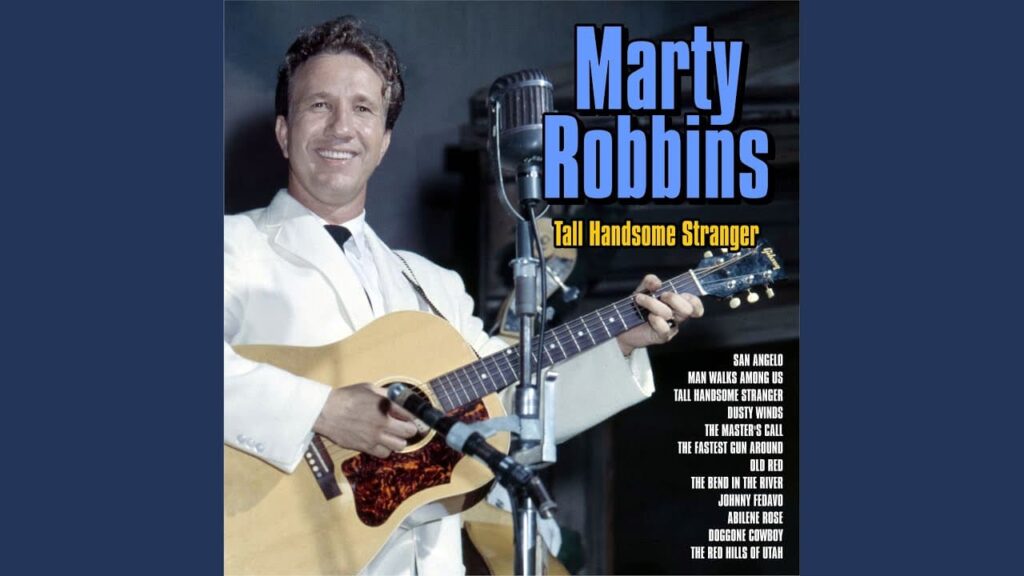
Marty Robbins – “Utah Carol”: The Tragic, Heroic Tale of Sacrifice on the Western Trail
There are ballads that simply entertain, and then there are the ones that etch themselves onto the American consciousness, carrying the grit and the deep, often tragic, moral landscape of the Old West. Marty Robbins’ magnificent rendition of “Utah Carol” falls squarely into the latter category—a beautifully melancholic narrative of selfless love and heroic sacrifice that speaks directly to the enduring Western spirit of honor and duty. This is the kind of song that, once heard, you carry with you like the memory of an old friend’s face.
“Utah Carol” was a key track on Marty Robbins’ most influential and celebrated album, the 1959 masterpiece, Gunfighter Ballads and Trail Songs. While it was not released as one of the major chart-topping singles like “El Paso” (which hit number one on both the Country and Pop charts) or “Big Iron,” its position as the closing track on the original album is significant. It serves as the final, poignant word in a collection of legendary tales, bringing the album to a reflective, tearful close. The entire Gunfighter Ballads and Trail Songs album, a monument to the Western genre, was a massive commercial success, peaking at number 6 on the Billboard 200 and achieving Platinum status, cementing its—and “Utah Carol’s”—place in musical history.
The true power of “Utah Carol” lies in its narrative—a classic trail ballad of devotion paid for with the ultimate price. The song tells the story of the titular character, a rough-hewn, devoted cowboy—often interpreted as a loyal ranch hand, not necessarily an outlaw—who harbors a deep, pure affection for Lenore, the boss’s daughter. The tragedy unfolds with breathtaking speed during a cattle drive. Utah tries to make the journey easier for the young woman, placing his own saddle blanket onto her horse, but this act of kindness inadvertently spooks the horse, which throws Lenore directly into the path of a stampede.
What follows is an act of pure, unhesitating heroism. As the herd thunders toward the terrified girl, Utah Carol spurs his own mount into the thick of the chaos. He successfully pulls Lenore to safety, rescuing her from the crushing hooves. But the victory is bittersweet and heartbreaking: in the act of saving her, Utah Carol is himself trampled and killed. The final image of the cowboy lying lifeless, his heroic deed complete, is delivered with an emotional punch that can still bring a lump to the throat of a seasoned listener.
Marty Robbins‘ performance here is flawless. His vocals possess a gentle, rolling rhythm that captures the feel of a campfire story being told under a wide, star-filled sky. He doesn’t just sing the words; he embodies the weary narrator who witnessed the event, his voice carrying the sorrow and respect for the fallen hero. The arrangement is sparse, featuring the clean, crisp acoustic guitars of the phenomenal session musicians—Grady Martin and Jack Pruett—that anchor the album’s authentic Western sound.
For those of us of a certain age, who grew up on the stories of courage and sacrifice that defined the Western mythos, “Utah Carol” is more than a song; it’s a testament. It harks back to a time when honor, grit, and the willingness to lay down one’s life for another were the highest virtues. It reminds us that the deepest love is often expressed not in flowery words but in final, irreversible actions. The song is a mournful, yet ultimately uplifting, tribute to the noble, unsung heroes of the trail—the men whose deeds are written not in history books, but in the timeless sorrow of an old, beautiful ballad. It is a stirring, deeply affecting piece that perfectly captures the bittersweet elegance of a life lived and lost with purpose.